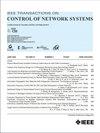大型基础设施网络的可伸缩原始分解方案
IF 5
3区 计算机科学
Q2 AUTOMATION & CONTROL SYSTEMS
引用次数: 0
摘要
大型基础设施网络的运行需要可扩展的优化方案。为了保证系统的安全运行,在少量迭代中实现高度的可行性是很重要的。分解方案可以帮助实现可伸缩性。然而,在可行性方面,经典的方法,如乘法器的交替方向法(admm),往往收敛缓慢。在这项工作中,我们提出了层次结构强凸二次规划的原始分解格式。这些方案结合全局收敛保证,在少量迭代中提供了高度的可行性。我们将它们的性能与集中式现成的内点求解器Ipopt和ADMM进行基准测试,以解决多达30万个决策变量和约束的问题。我们发现所提出的方法解决问题的速度与Ipopt一样快,但减少了通信并且不需要完整的模型交换。此外,所提方案的精度高于ADMM。本文章由计算机程序翻译,如有差异,请以英文原文为准。
Scalable Primal Decomposition Schemes for Large-Scale Infrastructure Networks
The operation of large-scale infrastructure networks requires scalable optimization schemes. To guarantee safe system operation, a high degree of feasibility in a small number of iterations is important. Decomposition schemes can help to achieve scalability. In terms of feasibility, however, classical approaches, such as the alternating direction method of multipliers (ADMMs), often converge slowly. In this work, we present primal decomposition schemes for hierarchically structured strongly convex quadratic programs. These schemes offer high degrees of feasibility in a small number of iterations in combination with global convergence guarantees. We benchmark their performance against the centralized off-the-shelf interior-point solver Ipopt and ADMM on problems with up to 300 000 decision variables and constraints. We find that the proposed approaches solve problems as fast as Ipopt, but with reduced communication and without requiring a full model exchange. Moreover, the proposed schemes achieve a higher accuracy than ADMM.
求助全文
通过发布文献求助,成功后即可免费获取论文全文。
去求助
来源期刊

IEEE Transactions on Control of Network Systems
Mathematics-Control and Optimization
CiteScore
7.80
自引率
7.10%
发文量
169
期刊介绍:
The IEEE Transactions on Control of Network Systems is committed to the timely publication of high-impact papers at the intersection of control systems and network science. In particular, the journal addresses research on the analysis, design and implementation of networked control systems, as well as control over networks. Relevant work includes the full spectrum from basic research on control systems to the design of engineering solutions for automatic control of, and over, networks. The topics covered by this journal include: Coordinated control and estimation over networks, Control and computation over sensor networks, Control under communication constraints, Control and performance analysis issues that arise in the dynamics of networks used in application areas such as communications, computers, transportation, manufacturing, Web ranking and aggregation, social networks, biology, power systems, economics, Synchronization of activities across a controlled network, Stability analysis of controlled networks, Analysis of networks as hybrid dynamical systems.
 求助内容:
求助内容: 应助结果提醒方式:
应助结果提醒方式:


